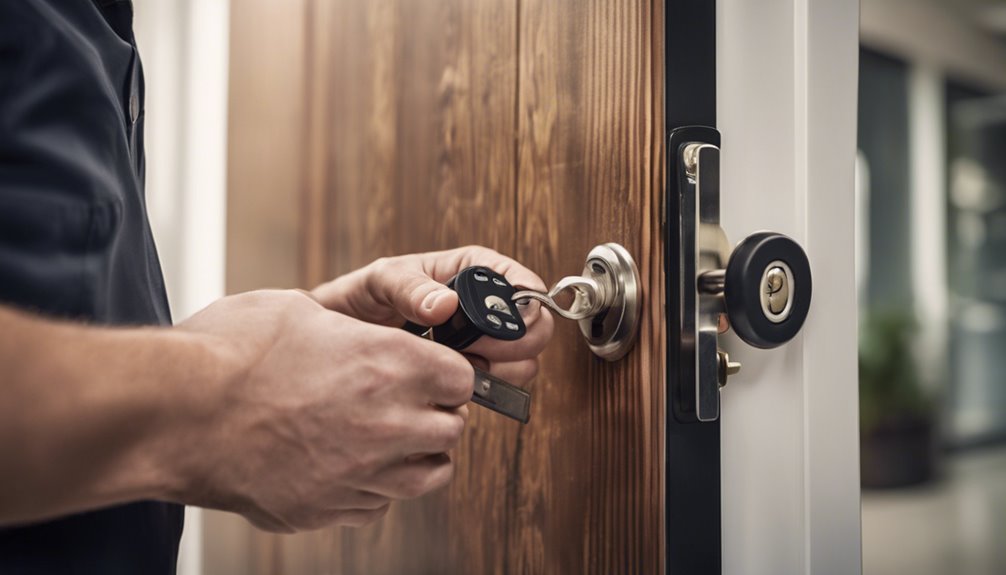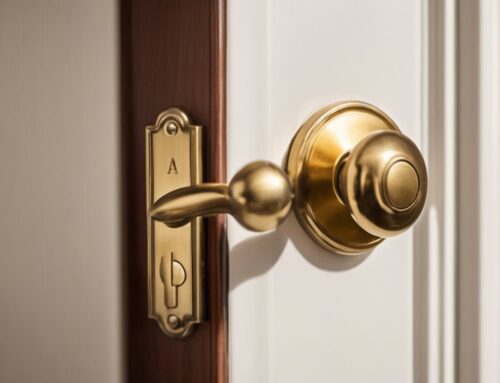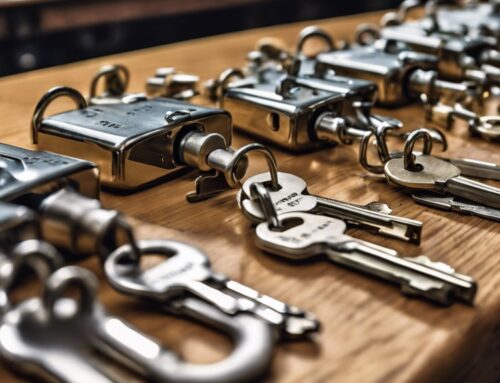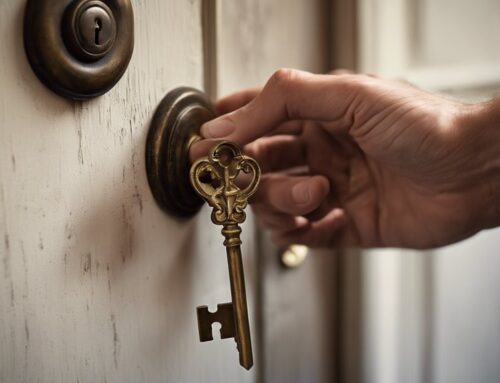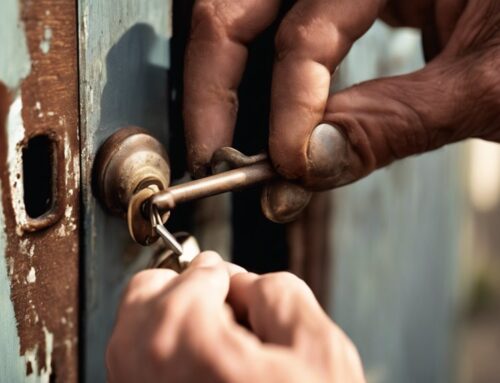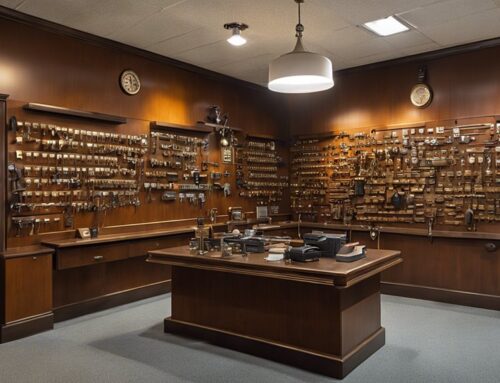Did you know that Illinois has some of the strictest regulations governing digital and smart locks in the country? You might be surprised to learn how thorough these regulations are and how they impact your responsibilities as a locksmith. From compliance with fire safety standards to tenant privacy concerns, the legal landscape is complex and constantly evolving. If you want to guarantee that your practices are up to date and meet all necessary requirements, you'll need to evaluate several key factors carefully. Let's explore what you should know to navigate this challenging environment efficiently.
Key Takeaways
- Lock installations must comply with manufacturer's specifications and industry standards to ensure safety and functionality.
- Locksmiths must understand ADA compliance to effectively serve clients with disabilities in lock installations.
- Knowledge of rekeying and lock change laws in Illinois is essential for maintaining compliance with tenant rights.
- Smart locks require proper documentation and adherence to fire safety and accessibility standards from NFPA and ADA.
- Digital locks must respect tenant consent, ensuring robust data processing protocols for privacy and security.
Licensing Requirements Overview

When considering a career as a locksmith in Illinois, it's important to understand the licensing requirements that govern the profession.
First off, you need to meet certain eligibility criteria. You must be at least 18 years old, demonstrate good moral character, and avoid any felony convictions within the last ten years. Furthermore, it's vital you don't have mental ailments or addictions that could compromise your ethical obligations, and you shouldn't have been dishonorably discharged from the armed forces. Additionally, you should ensure you stay informed about the current industry standards to maintain compliance with evolving regulations, as this is essential to prevent fraud and abuse in the locksmith profession.
Once you clear the eligibility hurdle, you must tackle the licensing examination. This test covers both the theory and practice of locksmithing and consists of 305 multiple-choice and true/false questions. Remember, this exam is offered biannually—in March and September. You'll need to apply at least 60 days beforehand or you might consider submitting results from an ALOA exam as an alternative. Additionally, specific ongoing education is essential for keeping your skills updated and fulfilling license renewal requirements.
Additionally, a background check with fingerprinting is mandatory. This must be executed by a licensed individual from a law enforcement agency or a certified organization. The background investigation is significant; having a felony conviction in the past decade can disqualify you from licensure.
Lastly, you'll submit your application through the Illinois Department of Financial and Professional Regulation (IDFPR), providing proof of business liability insurance, along with the necessary fees.
Every three years, you'll renew your license, ensuring you remain compliant with the state's regulations.
Importance of Training and Education
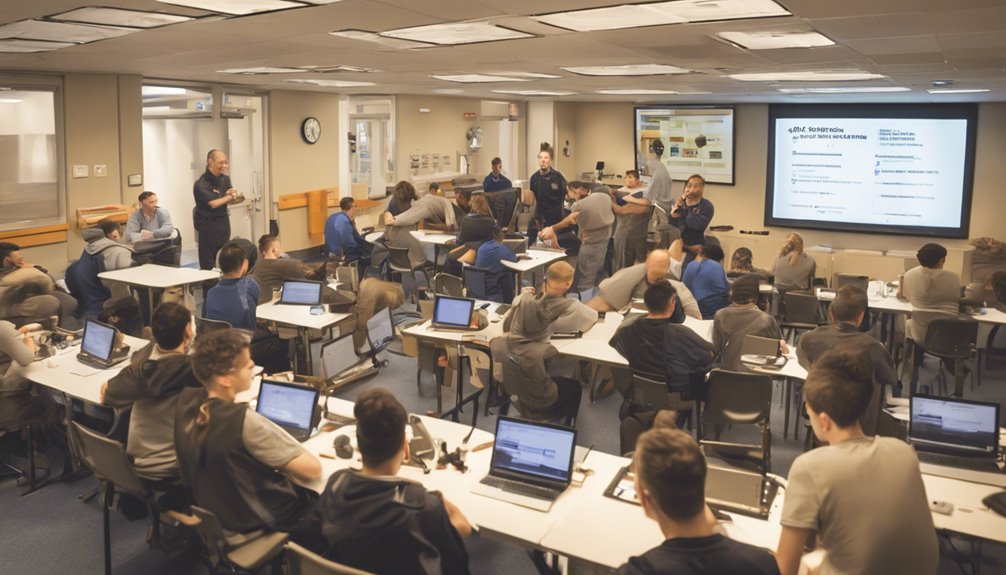
While the licensing process sets the foundation, the importance of training and education can't be overstated for Illinois locksmiths. Completing an approved 20-hour training course isn't just a requirement; it's vital for your competence and professional growth. Courses from established institutions, such as the Lockmasters Security Institute, equip you with the necessary skills and knowledge in locksmithing. Additionally, a certificate from a Department of Labor Apprenticeship Program enhances your credentials. Understanding the apprenticeship laws ensures compliance within the industry. Furthermore, recognizing the significance of ADA compliance is crucial to serve all customers effectively.
Hands-on experience is essential. Training involves practical exercises that familiarize you with key identification, creation, and duplication, as well as the workings of various lock types including safes and digital locks. Codelocks training specifically targets skills in installation and servicing smart locks, ensuring you're well-versed in this increasingly popular technology. Moreover, as part of the licensing requirements, you must complete the Locksmith Licensure Examination to validate your skills.
Additionally, ongoing education is mandated, requiring 24 hours every three years for license renewal. This continuous learning helps you stay current with cutting-edge products and methodologies in locksmithing. By participating in refresher courses, like those offered by Codelocks, you not only maintain your proficiency but also gain confidence in handling advanced lock systems.
Ultimately, specialized training in digital and smart locks is invaluable. It opens doors to new business opportunities and enhances your client service capabilities. The satisfaction expressed by locksmiths who undergo this training highlights its practical benefits.
Investing in your education isn't just about compliance; it's a commitment to excellence in your craft.
Background Check Procedures
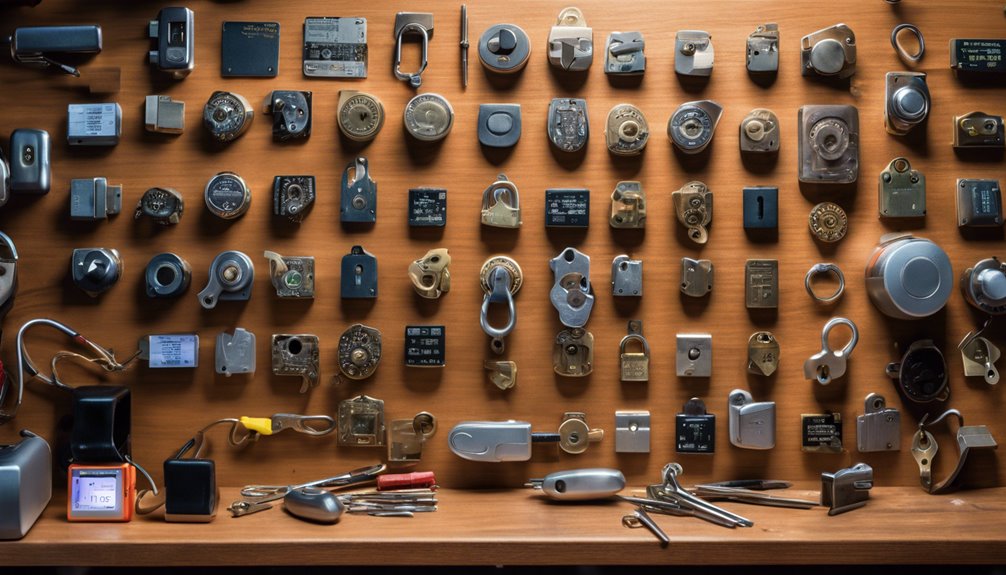
Before you can earn your locksmith license in Illinois, completing a thorough background check is mandatory. This process involves a fingerprint-based criminal history check, essential for demonstrating that you can handle the security responsibilities of the profession. You must be at least 18 years old and showcase good moral character. Additionally, any history of alcohol, substance abuse, or felony convictions—even if ten years have lapsed since the completion of a felony sentence—can jeopardize your eligibility. It's also important to note that a valid locksmith license is essential for employment or business operation. This requirement also reinforces the importance of understanding rekeying laws regarding security in rental properties.
To initiate your background check, you'll need to schedule an appointment with a licensed fingerprint vendor. This fingerprint processing must occur within 60 days of submitting your application. The results of your background check play a critical role in determining your licensure status; they're sent to the Illinois Department of Financial and Professional Regulation (IDFPR) for evaluation. It is crucial to be aware of the lock change laws in Illinois, as they may impact how locksmiths perform their duties.
Failing to pass the background check is a non-negotiable deal-breaker. Without a clean record—no felony convictions or dishonorable discharges from the armed forces—you risk denial of your license.
This thorough vetting process underscores the importance of public safety and trust in locksmith services. Remember, this requirement will be in place until January 2029, after which some licensing constraints, including background checks, will be repealed.
Preparing thoroughly for this step will greatly enhance your chances of obtaining your license and a fulfilling career as a locksmith.
Exam and Proficiency Standards

To qualify as a licensed locksmith in Illinois, you must navigate a rigorous exam and proficiency standards that test your foundational knowledge and practical skills. Begin by applying through the Illinois Department of Financial and Professional Regulation (IDFPR). Make sure to submit your application at least 60 days before the examination, as well as pay requisite fees, which can total up to $800 if using ALOA exam scores.
The State of Illinois Locksmith License Examination consists of 305 questions in multiple-choice and true/false formats, spanning 4 hours. This examination occurs twice a year, in March and September, and it evaluates your knowledge in various locksmithing theories and practices, including mechanical and electronic locking devices. Understanding employment laws is also necessary for compliance as a licensed locksmith.
If using ALOA exam scores, you'll also encounter specific sections covering Mandatory, Code, and Electricity.
Preparation is key. Completing an approved 20-hour basic locksmith training course lays a solid groundwork. Review the materials thoroughly and consider apprenticeships with experienced locksmiths to develop vital practical skills. Utilize resources provided by IDFPR and locksmith associations to refine your knowledge further.
Additionally, understanding essential lock safety standards is crucial for the practical application of your skills. Once you pass the exam, there's a waiting period for results. To finalize your licensure, pay any outstanding fees and provide proof of insurance.
Smart Lock Compliance Issues
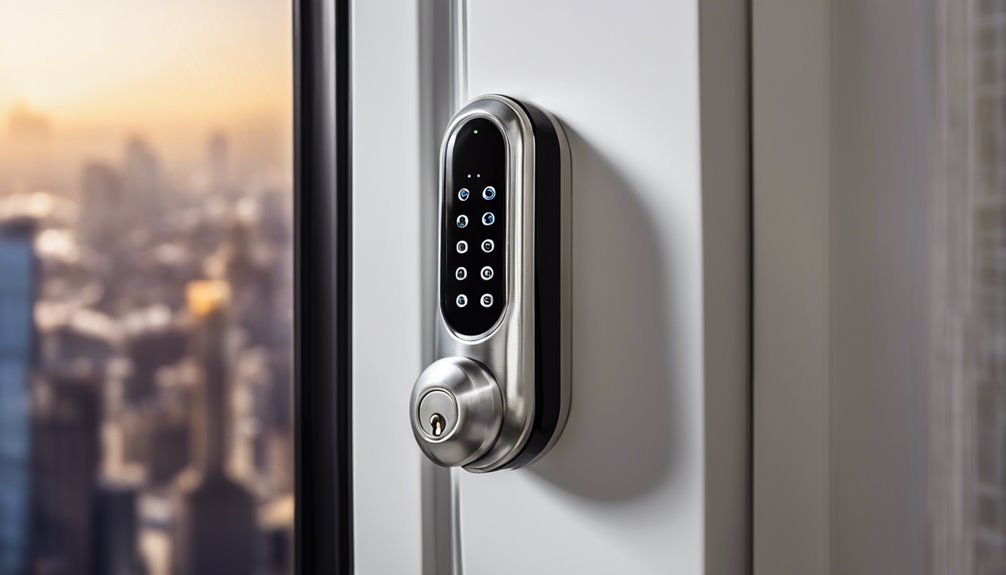
Smart Lock Compliance Issues
Steering smart lock compliance issues is imperative for both landlords and locksmiths in Illinois, as the evolving landscape of property management necessitates adherence to state laws and safety standards. While no specific Illinois laws mandate smart locks, you must comply with the Illinois Landlord and Tenant Act, guaranteeing all locks are secure and changed or rekeyed between tenants. This safeguards the protection of new tenants and mitigates liability risks for landlords. Practicing locksmithing without proper authorization can lead to severe penalties, underscoring the importance of compliance.
When installing smart locks, you must follow the manufacturer's specifications and industry standards to prevent any potential legal consequences. Additionally, compliance extends to fire safety and accessibility standards established by the National Fire Protection Association (NFPA) and the Americans with Disabilities Act (ADA). Proper documentation of these installations is essential, as it demonstrates adherence to safety codes.
It's important to note that smart locks are encompassed within the mandates for lock changes without exceptions unless specified in the lease. Non-compliance could lead to significant liability for theft or damage, jeopardizing both landlords' interests and tenant safety. Furthermore, ensuring compliance with key duplication laws in Illinois is critical to avoid legal pitfalls associated with unauthorized access.
As a locksmith, your installation practices should reflect the highest standards, particularly with licensing requirements set to sunset in 2029. Maintain best practices by verifying credentials and documenting any changes to smart locks. This not only protects your clients but also reinforces your reputation in an industry susceptible to unqualified competitors and reinforces the need for licensed professionals to avoid unauthorized locksmithing.
Regulations for Residential Installations
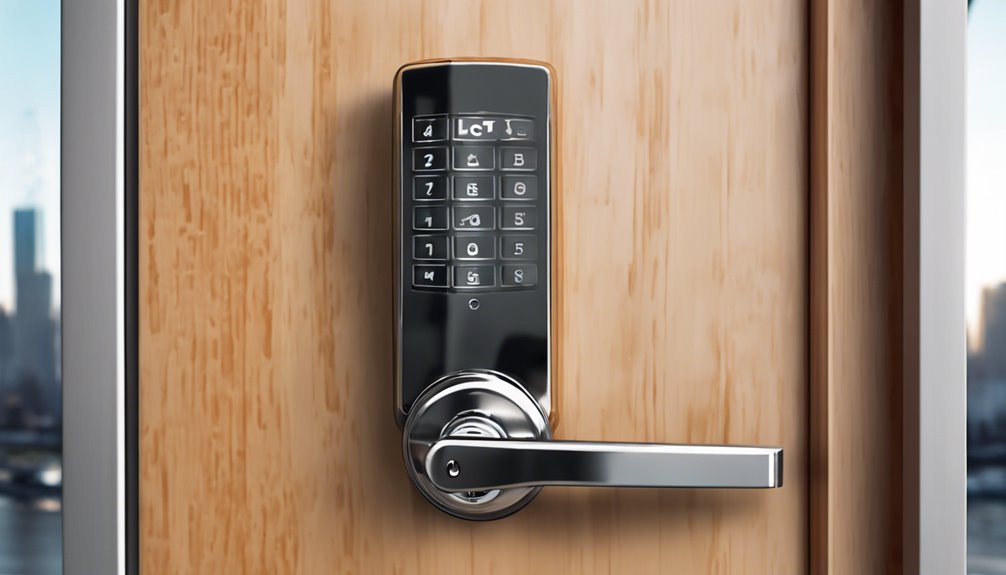
When installing digital locks in residential settings, you must guarantee compliance with tenant laws to protect both resident privacy and safety.
Adhering to installation best practices not only meets legal requirements but also enhances the functionality and reliability of locking mechanisms.
Understanding these regulations is essential for maintaining security and accountability in residential installations.
Compliance With Tenant Laws
As digital locks become more prevalent in residential settings, compliance with tenant laws is essential for landlords and service providers. Understanding and adhering to these laws not only protects your tenants' privacy but also shields you from potential legal repercussions.
Here are three key points to remember:
- Tenant Consent: Always obtain informed, voluntary consent from tenants before installing smart locks. They should have the option to choose traditional locks.
- Data Protection: Limit data processing to what's necessary for the lock's operation. Never use tenant data for harassment or eviction purposes, and employ robust security protocols to protect this information.
- Right to Lock: Tenants deserve the ability to lock and release their doors freely, except in documented cases of health or safety concerns. Any restrictions must be tailored to individual circumstances and outlined in a Personal Plan.
Incorporating these practices into your operations not only fosters respect for tenant autonomy but also enhances your reputation in the community.
Installation Best Practices
To guarantee safe and compliant installations of digital locks in residential settings, you must adhere to specific regulations that not only meet accessibility standards but also enhance overall security. Understanding these regulations helps in providing a safer environment for all occupants, especially those with disabilities.
| Installation Requirement | Compliance Notes |
|---|---|
| Accessibility Compliance | Must meet state and federal accessibility requirements. |
| Release Mechanism | Must allow for release without a key or tool from the occupied side. |
| Emergency Procedures | Locking mechanisms can only be engaged during emergencies; notify local authorities. |
| School Safety Plan Integration | If in a school district, document lock use in the safety plan. |
| Local Authority Communication | Notify law enforcement and fire departments about the locking mechanisms. |
Make certain your installations are compliant with the Americans with Disabilities Act (ADA) requirements. Utilize locking mechanisms that can be released in one motion, and guarantee that all personnel are trained in proper use. This diligence not only enhances safety but fortifies trust within your community, allowing for freedom and security in residential spaces.
Landlord Responsibilities and Lock Changes
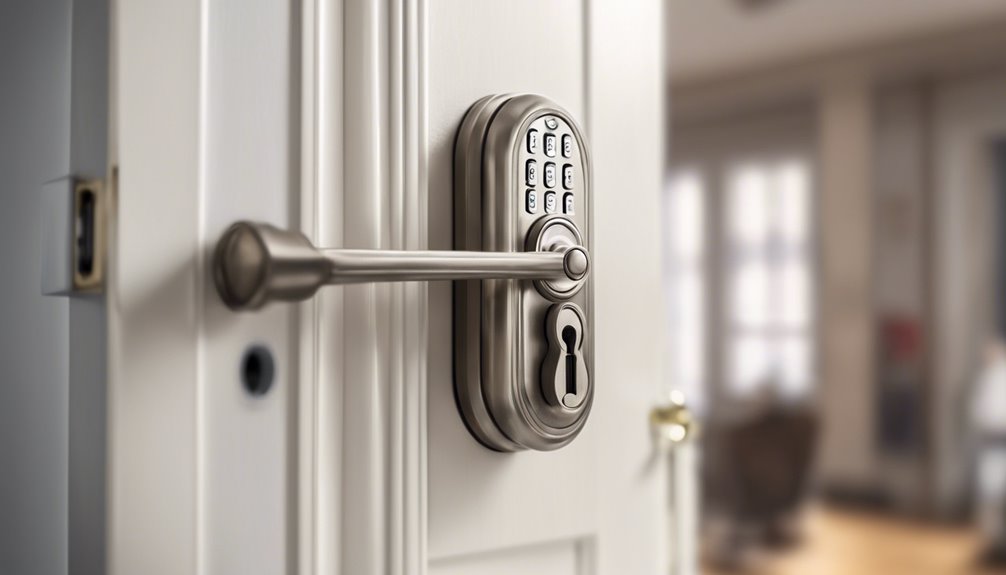
While managing rental properties in Illinois, it's essential for landlords to understand their responsibilities regarding lock changes, particularly after a tenant vacates.
Ensuring security for new tenants isn't just ethical; it's also a legal obligation in many cases. Here's what you need to know:
- Lock Changes Required: You must change or re-key locks when a new tenant arrives and has a written lease. This keeps their space secure and avoids liability for any theft that may occur if locks aren't updated.
- Compliance Timeline: The lock change must occur on or before the new tenant's move-in date. This timing is vital to avoid any legal issues, especially in populous counties like Cook.
- Special Circumstances: If a tenant faces domestic or sexual violence, they can request a lock change, which you must accommodate within 48 hours of receiving proper documentation.
Failing to respond can escalate the situation and leave your property vulnerable.
Legal Consequences of Non-Compliance

Failing to comply with Illinois locksmith regulations can lead to significant legal repercussions that jeopardize your business. Operating without a valid license not only exposes you to heavy fines but also increases the risk of lawsuits. If you're caught practicing unlicensed, expect monetary penalties that can drain your resources and potentially shut down your business operations entirely.
Current licensing requirements, such as passing a proficiency test and undergoing a criminal background check, are non-negotiable. Ignoring these criteria means risking your ability to legally operate within the state. Even more critical, a conviction for unlicensed practice can bar you from obtaining a license in the future, severely limiting your professional options.
Additionally, adhering to compliance codes for specific locking systems is essential. Installation of non-compliant locks could lead to safety hazards, potentially endangering lives and incurring costly system replacements. Regulatory authorities take such violations seriously, leading to further legal action and financial liabilities.
Maintaining good moral character is mandatory not just to obtain but also to retain your license. Breaching this standard can result in severe ramifications, including revocation of your license. In a profession founded on trust and security, any lapse can ruin your reputation and operational viability.
Ultimately, staying compliant isn't just a legal obligation; it's a strategic choice that safeguards your freedom to operate and grow in the locksmith industry. Embrace these requirements—your future depends on it.
Continuing Education Requirements
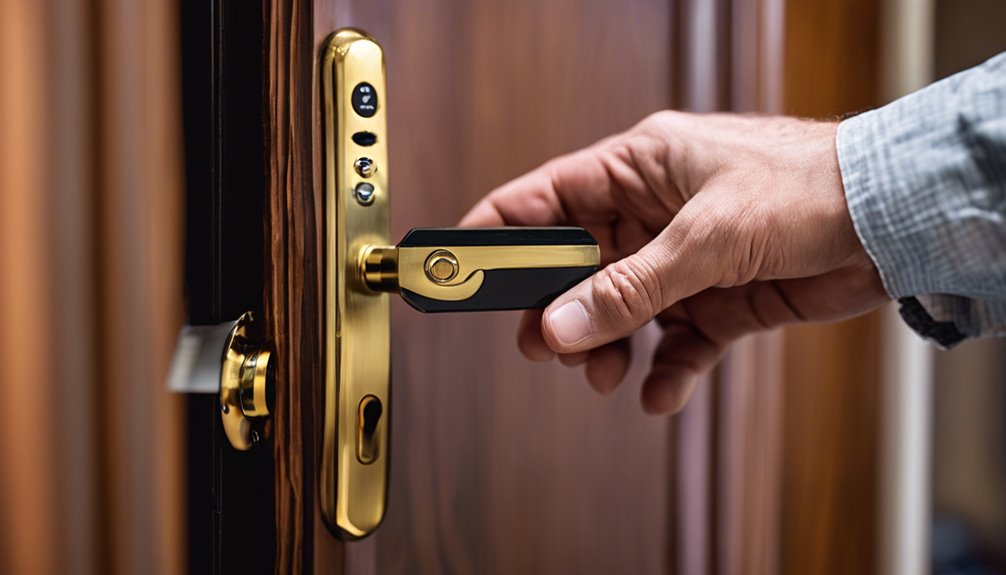
Continuing education is essential for maintaining your locksmith license in Illinois, requiring you to complete 24 hours every three years.
This training guarantees you keep your skills updated and stay informed about advancements in the locksmithing field.
You'll need to choose courses that align with your practice and document your progress for license renewal.
Ongoing Training Necessity
As the locksmithing industry evolves rapidly, ongoing training is vital for maintaining your skills and knowledge. To retain your license and remain competitive, you'll need to fulfill specific continuing education requirements every three years.
Here are key aspects to reflect on:
- Course Approval: Only participate in courses approved by the Illinois Department of Financial and Professional Regulation (IDFPR).
- Total Hours: Complete 24 hours of continuing education to ascertain you're up-to-date with the latest industry advancements.
- Documentation: Keep meticulous records of your training for potential audits; failure to do so could jeopardize your licensing.
Engaging in ongoing training not only helps you comply with regulations but also enhances your expertise in advanced locksmithing techniques, new technologies, and safety codes.
As the landscape shifts, keeping informed about potential changes in licensing requirements post-2029 is important. Embracing continuous education emphasizes your commitment to professional growth and positions you as a knowledgeable locksmith in a competitive environment.
Don't underestimate the value of staying current—your license, skillset, and career depend on it.
Skills Update Requirements
While staying updated with industry skills is essential, Illinois locksmiths must engage in continuing education every three years to maintain their licenses. This requirement aligns with the license renewal cycle and guarantees that you remain competent in your craft.
As technology evolves, so does the necessity to adapt to new methodologies and innovations in locksmithing. Your continuing education will cover important topics such as lockset functions, life safety codes, basic electricity, and advanced key origination techniques.
Understanding master keying and pin tumbler locks is equally significant, as these skills enhance your service offerings. To satisfy these requirements, you can choose from recognized certifications like ALOA's CLL, CRL, CPL, and CML.
Additionally, courses from respected institutions, such as Lockmasters Security Institute, will serve you well. Upon completion, you'll need to maintain accurate documentation of your training, submitting a certificate of completion and all records to the Illinois Department of Financial and Professional Regulation (IDFPR).
Staying on track not only protects your license but also upholds professional standards essential to retaining your customers' trust.
Future Trends in Smart Locks

The evolution of smart locks is reshaping the future of home security, driven by advancements in technology and consumer demand for integrated solutions. As you consider the next generation of these devices, you'll want to keep an eye on three key trends that promise to redefine your experience:
1. Integration with Smart Home Ecosystems**: Smart locks are becoming increasingly compatible with voice assistants** like Amazon Alexa and Google Assistant, allowing seamless control.
Expect enhanced interoperability with other devices, such as smart thermostats and security cameras, and real-time updates through 5G technology.
2. Enhanced Security Features: Advanced biometric methods, including facial recognition and palm-print scanning, will soon be commonplace.
Look for the adoption of blockchain technology to create secure, tamper-proof access logs, complemented by regular firmware updates and multi-factor authentication to protect against cyber threats.
3. Improved User Experience**: Touchless access** via RFID or ultra-wideband technology is on the horizon, promoting convenience and minimal physical contact.
Enhanced power management will guarantee longer battery life, while stylish designs will integrate well with modern architecture, allowing you to customize your locks to fit your aesthetic.
Frequently Asked Questions
Can Locksmiths Install Smart Locks Without Specific Training?
Yes, you can install smart locks without specific training.
While there's no legal requirement for locksmiths to undergo training for smart lock installation, your general locksmithing skills should suffice.
Most smart locks are designed for DIY installation, making it accessible to those familiar with traditional locks.
Hence, if you've got the know-how, you're free to tackle smart lock installations confidently, leveraging your existing skills without additional certification or training.
Are There Warranties for Installed Smart Locks?
Yes, most locksmith services offer warranties for installed smart locks.
You'll typically find warranties covering parts and labor varying in duration, like 90 days for parts and 30 days for labor.
However, keep in mind that warranties don't cover misuse or weather-related damages.
It's wise to check with your service provider to understand the specific terms and coverage, ensuring you have the support you need should issues arise after installation.
How Does Customer Feedback Impact Locksmith Licensing Renewal?
While there's no direct evidence linking customer feedback to locksmith licensing renewal, it's worth mentioning that about 70% of consumers trust reviews as much as personal recommendations.
Your compliance with licensing requirements remains the central focus for renewal. It's essential you stay informed about regulations, as they shape your professional landscape.
Positive feedback can enhance your reputation, potentially influencing local regulations indirectly, but the core licensing decisions hinge on strict compliance.
Can Homeowners Install Smart Locks Without Professional Help?
Yes, you can install smart locks without professional help.
While homeowners are permitted to do so, it's essential to follow the manufacturer's instructions closely. Improper installation could jeopardize your security, so consider seeking professional help if you're unsure.
Make certain your chosen lock complies with local building codes and security standards to guarantee maximum effectiveness.
Also, integrating your smart lock with other security systems can greatly enhance your home's protection.
What Are Common Smart Lock Security Vulnerabilities?
Imagine your fortress, built strong yet harboring hidden cracks. Common smart lock vulnerabilities reveal themselves like unwelcome guests.
Encryption downgrade attacks can expose your accessKey, while flawed firmware may invite malicious updates.
Biometric data, unguarded, is ripe for theft.
Man-in-the-middle threats lurk, waiting to eavesdrop on commands, while simple Bluetooth sniffing can expose passwords.
As you seek freedom in security, recognize these weaknesses to fortify your defenses effectively.
Conclusion
In the ever-evolving landscape of locksmithing, especially with digital and smart locks, staying informed isn't just smart—it's essential. As you navigate compliance with ADA standards and local laws, remember, a minor oversight can lead to serious legal consequences. Coincidentally, embracing ongoing education not only keeps you compliant but also positions you as a trusted expert in your field. By remaining vigilant and proactive, you safeguard your business and foster tenant trust, ultimately enhancing your professional reputation.

